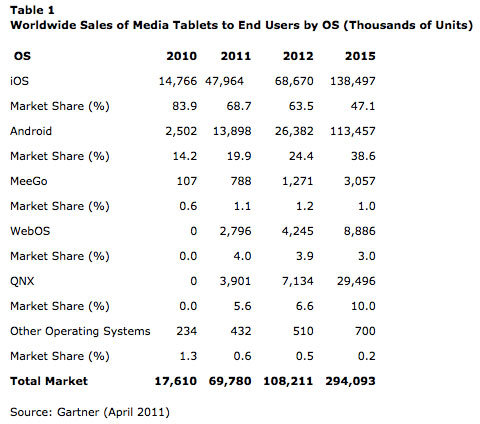The Future of Tablets: Also Unknowable
By Harry McCracken | Monday, April 11, 2011 at 10:39 am
 A couple of weeks ago, I wrote about IDC’s projections for smartphone operating-system marketshare in 2015, and came to the conclusion that the whole exercise of predicting phone sales that far in the future is pointless–at least if you’re doing so in a form which suggests a scientific approach.
A couple of weeks ago, I wrote about IDC’s projections for smartphone operating-system marketshare in 2015, and came to the conclusion that the whole exercise of predicting phone sales that far in the future is pointless–at least if you’re doing so in a form which suggests a scientific approach.
Now IDC rival Gartner is making some 2015 predictions of its own. These ones are for tablets, and they forecast that Apple’s share will fall under 50 percent, Android will surge to nearly 40 percent, and QNX, WebOS, MeeGo, and everything else will fight over the remainder of the market.
 As ZDnet’s Larry Dignan notes, Gartner doesn’t break out any flavor of Windows in the above numbers, which apparently means that it thinks that Microsoft will be part of the “Other Operating Systems” that make up two-tenths of one percent of the market. Even an extreme Microsoft skeptic who thinks that the company will be a dismal failure in the tablet business might come up with a higher figure than that. Three percent, say?
As ZDnet’s Larry Dignan notes, Gartner doesn’t break out any flavor of Windows in the above numbers, which apparently means that it thinks that Microsoft will be part of the “Other Operating Systems” that make up two-tenths of one percent of the market. Even an extreme Microsoft skeptic who thinks that the company will be a dismal failure in the tablet business might come up with a higher figure than that. Three percent, say?
You might be inclined to think Microsoft will flop in tablets; you might lean towards thinking that it’ll figure out how to get back in the game. Either way, the fact of the matter is that we just don’t know what’ll happen. Nor is it clear how things will play out for any other tablet OS. Even Android has a negligible share of the market today, so predicting that it’ll get to 38.6 percent in four years is speculative, not scientific.
And speaking of 38.6 percent, why do these forecasts always include numbers that extend past the decimal point? Gartner says that it thinks that iOS will have 47.1 percent of the tablet market in 2015, which translates into 138,497,000 iPads sold. Even if you’re way smarter about this stuff than I am, it makes no sense to be that precise–“about 50 percent” would be a better way of expressing this forecast, and even that is a guess that could well turn out to be way, way off in either direction. (At least Gartner doesn’t say that Apple will sell exactly 138,497,261 iPads.)
I don’t mean to bash Gartner here specifically any more than I intended to beat up on IDC. And there are mature categories where research companies might have a pretty good shot at looking ahead four years and getting it right, such as printers.
But tablets? The whole category is so nascent that talking about 2015 is like making forecasts in 1979 about the market share of major PC manufacturers in 1983. I wonder if Gartner did that?
(Fortune teller photo by Flickr user Uzbeckistan.)
6 Comments
Read more:













April 11th, 2011 at 10:46 am
Couldnt agree more with you!
April 11th, 2011 at 10:58 am
Many years ago, I needed an estimate for the gross domestic product of China (before the PRC had really joined the world economy.) The CIA was the go-to agency for such things, so I asked an analyst. He said something like $852.7 billion. So I asked, "How many of those digitas are significant?" and he said "Maybe the first."
People seem to thing that adding spurious precision to numbers like this makes them sound more authoritative. It's a good lesson in the difference between precision and accuracy.
April 11th, 2011 at 12:26 pm
Well said.
April 11th, 2011 at 12:35 pm
Why is Windows not in the list? Likely because, by Gartner’s definition, Windows tablets are counted as PCs, not media tablets.
Another thing: Gartner predicts that the Playbook will keep growing as fast as Android, while WebOS will lose its early lead. Why is that? What do they know about RIM and HP that we don’t?
April 11th, 2011 at 12:44 pm
Good guess on the absence of Windows. But of course, we don’t really know anything about what Windows-based tablets will look like in 2015 and whether they’ll be distinguishable as a category from ones based on iOS and Android. (My wild guess: they’ll be pretty darn similar.)
–Harry
April 12th, 2011 at 5:16 am
I agree. There’s something definitely ‘off’ in all these breathless blogs and media reports stating “the public is going tablet crazy” when the fact is the public is only going iPad crazy.
Predicting future market share of tablets based on operating systems that have not yet been released, without a single product shipped or sold, like QNX and WebOS and Windows8 tablets, is the height of lunacy.
But these ‘analysts’ are often accused of doing nothing but trying to sell stocks in one company or another.